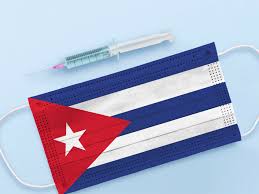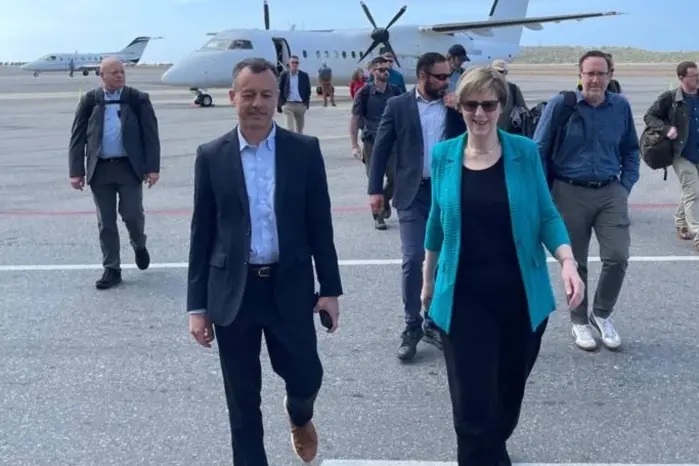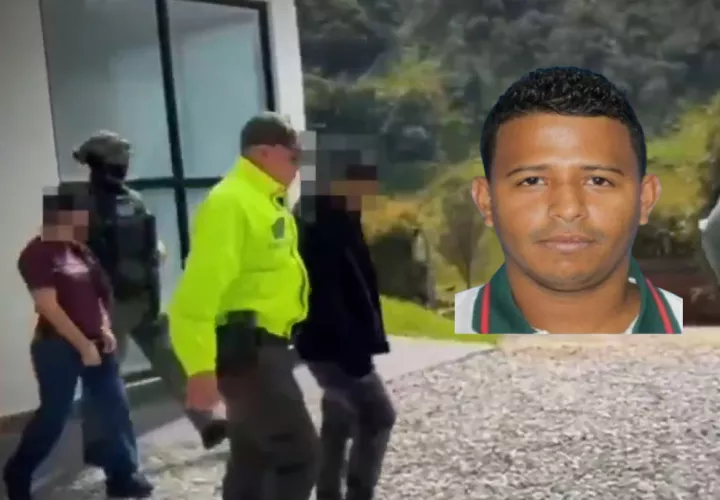Cuba testing first Latin American vaccine

t’s a gamble that may sound crazy, but experienced Cuban researchers have focused on the task of developing the
first coronavirus vaccine conceived and produced in Latin America.
“We have the capacity to manufacture 100 million doses” in 2021 of Soberana 2,
the most advanced vaccine project, said Dr. Vicente Vérez, director of the Finlayvaccine institute, on Wednesday. “If all goes well, this year we will have the entire population vaccinated.”
The country is one of the least affected in the region by the pandemic with 19,122registered cases and 180 deaths, among a population of 11.2 million inhabitants.
Soberana 2 moved to phase II b on Monday, with the collaboration of 900 volunteers. If successful, it would enter phase III (the last one before approval), with 150,000 volunteers in March.
The objective is to launch the vaccination campaign in the first semester. For Cubans the vaccine would be free but not mandatory. It would also be an “option”for tourists, Vérez said.
In a country where a quarter of the budget is spent on health and doctors are seen as heroes, participating in trials became a civic duty.
Madielin Garcia, a fifty-year-old who was selected, told the television newscast
she was “very excited because that is a very big step.”
Cuban scientists are working on four vaccines: Soberana 1 and 2, Abdala (named
after a dramatic poem by national hero José Martí), and Mambisa (named after
Cuban women during the struggle for independence in the 19th century).
The first three are given with an injection and the fourth with a nasal spray.
first coronavirus vaccine conceived and produced in Latin America.
“We have the capacity to manufacture 100 million doses” in 2021 of Soberana 2,
the most advanced vaccine project, said Dr. Vicente Vérez, director of the Finlayvaccine institute, on Wednesday. “If all goes well, this year we will have the entire population vaccinated.”
The country is one of the least affected in the region by the pandemic with 19,122registered cases and 180 deaths, among a population of 11.2 million inhabitants.
Soberana 2 moved to phase II b on Monday, with the collaboration of 900 volunteers. If successful, it would enter phase III (the last one before approval), with 150,000 volunteers in March.
The objective is to launch the vaccination campaign in the first semester. For Cubans the vaccine would be free but not mandatory. It would also be an “option”for tourists, Vérez said.
In a country where a quarter of the budget is spent on health and doctors are seen as heroes, participating in trials became a civic duty.
Madielin Garcia, a fifty-year-old who was selected, told the television newscast
she was “very excited because that is a very big step.”
Cuban scientists are working on four vaccines: Soberana 1 and 2, Abdala (named
after a dramatic poem by national hero José Martí), and Mambisa (named after
Cuban women during the struggle for independence in the 19th century).
The first three are given with an injection and the fourth with a nasal spray.
“Cuba “has been the first candidate in Latin America and the Caribbean to place
its vaccine in the clinical phase,” says José Moya, a local representative of the
World Health Organization (WHO), who calls himself “optimistic.”
The reason for his optimism comes from the fact that “Cuba has been producing
its own vaccines for more than 30 years. Almost 80% of the vaccines in Cuba’s
national immunization program are produced in the country.”
ttps://www.tvn-2.com/mundo/caribe/Cuba-apuesta-America-Latina-covid-19_0_5767673201.html 2/3
Under a US embargo imposed since 1962, the island has had to seek its own
remedies.
In the 1980s he opted for biotechnology, discovering the first vaccine against
meningococcus B, says Nils Graber, a researcher in health anthropology at the
University of Lausanne (Switzerland).
“The objective was both to improve the national health system and to be an
exporter,” he adds, citing the delivery of treatments that Cuba has made to Latin
America, Asia and Africa.
The export of medical services – medicines, vaccines and medical personnel – is
currently Cuba’s main source of income, with 6.3 billion dollars in 2018. In 2020,
the island sent medical brigades to 40 countries to fight the coronavirus.
“The population would have perceived in a very surprising and regrettable way
that Cuba would have had to import a Russian or Chinese vaccine,” observes the
researcher. Sending its doctors abroad and manufacturing its own vaccine “is also a policy
that increases thlitics G
its vaccine in the clinical phase,” says José Moya, a local representative of the
World Health Organization (WHO), who calls himself “optimistic.”
The reason for his optimism comes from the fact that “Cuba has been producing
its own vaccines for more than 30 years. Almost 80% of the vaccines in Cuba’s
national immunization program are produced in the country.”
ttps://www.tvn-2.com/mundo/caribe/Cuba-apuesta-America-Latina-covid-19_0_5767673201.html 2/3
Under a US embargo imposed since 1962, the island has had to seek its own
remedies.
In the 1980s he opted for biotechnology, discovering the first vaccine against
meningococcus B, says Nils Graber, a researcher in health anthropology at the
University of Lausanne (Switzerland).
“The objective was both to improve the national health system and to be an
exporter,” he adds, citing the delivery of treatments that Cuba has made to Latin
America, Asia and Africa.
The export of medical services – medicines, vaccines and medical personnel – is
currently Cuba’s main source of income, with 6.3 billion dollars in 2018. In 2020,
the island sent medical brigades to 40 countries to fight the coronavirus.
“The population would have perceived in a very surprising and regrettable way
that Cuba would have had to import a Russian or Chinese vaccine,” observes the
researcher. Sending its doctors abroad and manufacturing its own vaccine “is also a policy
that increases thlitics G
Geopolitics is never fe prestige of the country.”
Geopoar from the Cuban doctor. On January 8, the Finlay Institute
and the Pasteur Institute of Iran signed an agreement to test the effectiveness of
Sovereign 2 in phase III.
“Cuba’s vaccine will be the ALBA vaccine” (Bolivarian Alliance for the Peoples of
Our America), the vice president of Venezuela, Delcy Rodríguez, assured AFP
during a recent visit to Havana.
ALBA is made up of Cuba, Venezuela, Bolivia and Nicaragua.
Venezuela offers its “production capacity” to supply the countries of the alliance,
although “of course Cuba will be able to offer its vaccine to the world,” he added.
According to Moya, the Cuban vaccine “has been prequalified by PAHO (Pan
American Health Organization), it would be placed within the revolving vaccine
fund, which is the procurement mechanism that PAHO has with the countries of
the Americas to access vaccines with opportunity and at a reasonable price “.
“The laboratories have already reserved almost all their production for the year
and it is mainly the richest countries that have bought it, so these (Cuban)
vaccines will be necessary.”
Geopoar from the Cuban doctor. On January 8, the Finlay Institute
and the Pasteur Institute of Iran signed an agreement to test the effectiveness of
Sovereign 2 in phase III.
“Cuba’s vaccine will be the ALBA vaccine” (Bolivarian Alliance for the Peoples of
Our America), the vice president of Venezuela, Delcy Rodríguez, assured AFP
during a recent visit to Havana.
ALBA is made up of Cuba, Venezuela, Bolivia and Nicaragua.
Venezuela offers its “production capacity” to supply the countries of the alliance,
although “of course Cuba will be able to offer its vaccine to the world,” he added.
According to Moya, the Cuban vaccine “has been prequalified by PAHO (Pan
American Health Organization), it would be placed within the revolving vaccine
fund, which is the procurement mechanism that PAHO has with the countries of
the Americas to access vaccines with opportunity and at a reasonable price “.
“The laboratories have already reserved almost all their production for the year
and it is mainly the richest countries that have bought it, so these (Cuban)
vaccines will be necessary.”





